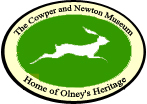|
THE MUSEUM PEOPLE
WORKS ORCHARD SIDE GARDENS |
 |
|
The Cowper and Newton Museum
|
|
John Newton biography: 3
|
| 1748 The Voyage of the 'Greyhound': Deliverance and Conversion The ship that Manesty sent out, called the 'Greyhound', traded not in slavery but in gold, ivory, beeswax and dyer's wood (sometimes known as 'cam wood' - an ingredient used in the dying industry). It was by pure luck that Newton heard news of the ship and his father's concern, but his circumstances had changed and he was now no longer sure he wished to return from the easy and profitable life he was enjoying. Only the thought of Polly made him hesitate. To settle the matter the captain fabricated a story about how he had seen papers, and heard, from Captain Newton and Mr. Manesty, that young Newton had come into an inheritance of £400 per annum. He also said that Newton would be treated as a passenger on board and not have to work his passage. Although Newton didn't believe the inheritance lie he reflected on how easily the ship might have sailed past Kittam, the area where he now was, and some hundred miles south of the Plantain Islands. Perhaps fate was at work calling him back home? Within an hour Newton's life had changed yet again and he was embarking on board the 'Greyhound'. In later years he marvelled at the serendipitous nature 'upon which my deliverance from Africa depended! Had the ship passed one quarter of an hour sooner, I had died there a wretch as I lived.' The 'Greyhound' spent nearly a year working her way south, trading. Newton could have made himself useful, keeping the occasional watch or becoming involved in the trading, but on board he idled away his time making himself thoroughly disliked. He derided anyone who had a Christian faith; he blasphemed and became adept at inventing new oaths, which even shocked the hardened crew. One night he and five others played a game, which involved drinking gin and rum alternately from a large seashell. He became drunk very quickly and tried to retrieve his hat, which had blown overboard. He was half over the side before someone pulled him back, saving him from drowning. Like many sailors he could not swim and his companions were in no fit state to be able to save him. 'The significance of this "and many other deliverances" from accident, folly, and serious fevers too, "were all at that time entirely lost to me".' (John Pollock) Eventually with her holds full the 'Greyhound' was ready for the long journey home. To reach Liverpool meant sailing across the Atlantic to the tip of north east Brazil to pick up favourable winds which would drive them to Newfoundland Banks, and thence re-crossing the Atlantic, a journey of seven thousand miles without making landfall! One of the few books on board was 'The Christian's Pattern' by Stanhope, which was based on Thomas a Kempis's 'The Imitation of Christ'. Newton was reading this on the voyage home. They had set sail in early January and by 9th of March a severe westerly gale was in progress. In the night Newton was awakened by a sudden jolt and water flooding into his cabin, followed by a cry from above that the ship was sinking. Going up on deck he met the captain who told him to get a knife. He turned back and the next person to go on deck was washed overboard. The ship was severely damaged and the crew set to pumping out the water and baling in another part of the vessel. Here in Newton's own words, from 'An Authentic Narrative' is an account of the ordeal.
Towards dawn the wind lessened and they were able to use bedding and clothes to plug the leaks, nailing pieces of boards over them, the intake of water slowed and the crew continued pumping. Newton remained at the pumps until noon, waves continually breaking over his head as he worked; he and other made themselves fast with ropes to prevent them from being washed overboard. In a state of exhaustion Newton, who had been at the pumps for some nine hours, went to his bunk to rest for an hour. He was called to steer the vessel until midnight. Here he had the opportunity for reflection on 'the extraordinary turns in my life; the calls, warnings, and deliverances I had met with... about six in the evening (I heard) that the ship was freed from water, there rose a gleam of hope. I thought I saw the hand of God displayed in our favour; I began to pray.'
Unlike Saul of Tarsus, Newton's 'road to Damascus' didn't occur in a blinding flash but in the period between 10th March, the day of the storm, and the 8th April when the 'Greyhound' came into port. At the age of seventy-seven Newton reflected again on these events:
It is perhaps worth mentioning that before Newton left Ireland, he had another of those miraculous escapes, which would have given him even more cause for reflection. He had been invited to join the mayor of Londonderry's shooting party; as he was climbing a bank the fowling piece he was carrying discharged near his face destroying a corner of his hat. Joan McKillop References
|
|
|


